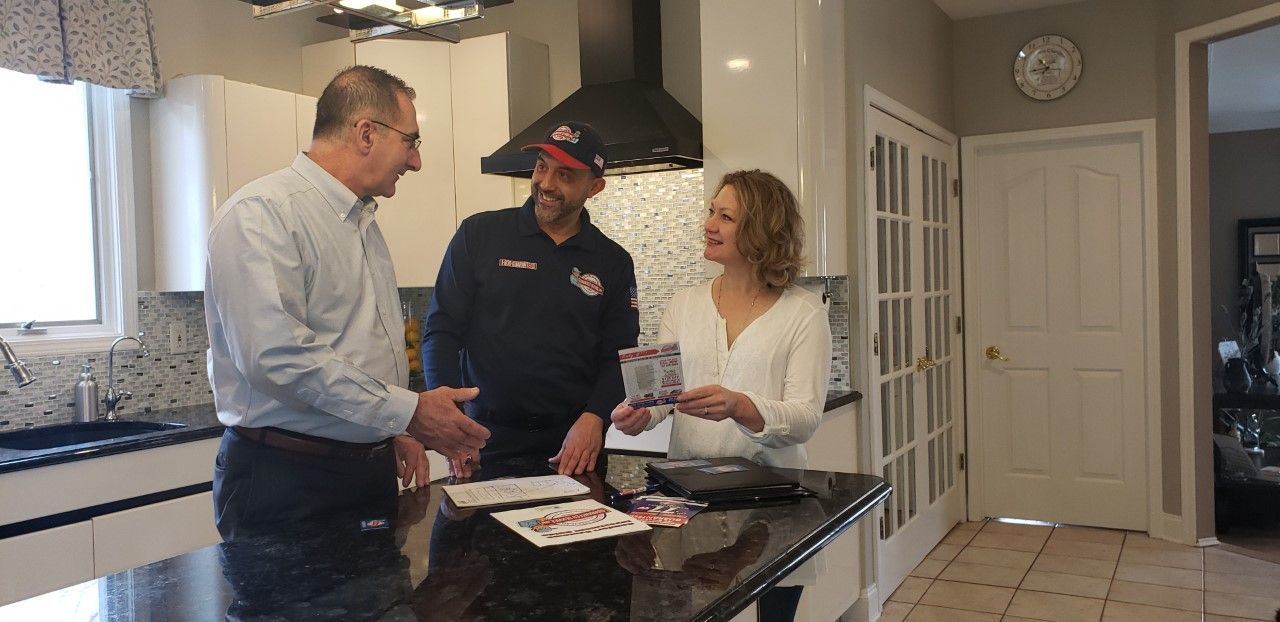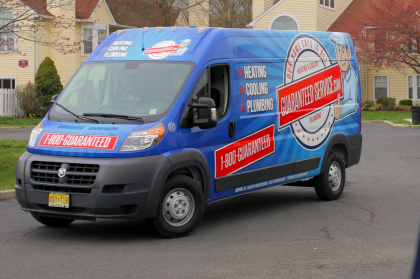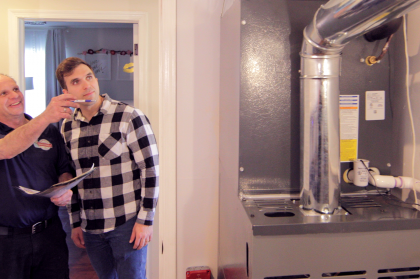Boiler Services in Manasquan & Central NJ
Serving homeowners across New Jersey.
When your home depends on a boiler heating system, you need a company you can trust to keep it running safely and efficiently. At Guaranteed Service, we provide professional boiler services across Manasquan and Central New Jersey. From fast boiler repair to expert gas boiler installation, our licensed HVAC technicians deliver the quality workmanship and reliability homeowners expect.
Call Now:
Contact us today to get
$300 OFF
any water or steam boiler replacement
BOILER SERVICES AT GUARANTEED SERVICE
New Jersey Boiler Services
Boiler Repair
A failing boiler can leave your home cold and uncomfortable. Our boiler repair service helps you get your heating system working again quickly and smoothly.
Common boiler problems we handle include:
- No Heat or Hot Water - Often caused by thermostat issues, pilot light failures, or broken components.
- Leaking Water - around your boiler can signal a serious problem, so you should inspect it immediately.
- Unusual Noises - Banging, whistling, or gurgling sounds may point to air in the system or worn-out parts.
- Low Pressure - A boiler losing pressure won’t operate efficiently, driving up your energy bills.
- Carbon Monoxide Risks - Our technicians ensure your boiler is venting safely and operating properly.
Regular boiler maintenance can prevent many problems. This helps your heating system last longer and saves you money over time.
Boiler Services in New Jersey
Types of Boilers
Do you have a boiler that isn't working? Are you in the market for a new one? Moving into a new home with a type of unit you're not familiar with? Guaranteed Service can help with any of these situations and make sure that you know exactly what you have and what kind of system would work best for you and your family.
Boilers come in many different varieties, each having specific characteristics for different purposes, such as:
Steam Boiler
Steam boilers use a heat exchanger to heat water and distribute it to a piped system connected to radiators around your home. They work by using both pressure and gravity to deliver steam to radiators and cycle the cooled condensation back into the boiler to be reheated.
The steps of steam boiler operation include:
- The system is partially filled with water
- The water is heated, in turn producing steam
- The system's pressure increases
- Steam travels up through the pipes and into the radiators
- The air vent on the radiator opens
- The vent closes once steam reaches it
- The radiator emits heat
- Steam then cools and condenses into water
- The cooled water travels back to the boiler to then be reheated
Water Boiler
Water boiler heating systems use pressure, volume, and temperature to provide safe and efficient heat to the radiators or baseboards throughout your home. They use one or more pumps to circulate heated water throughout your home.
The steps of water boiler operation include:
- Your thermostat calls for heat
- The burner (oil or gas) is activated, in turn heating the water in the boiler
- The pumps then either begin pumping the water throughout the system or wait for the water to heat to the desired temperature before pumping
- The heated water expands, and the extra volume is stored in an expansion tank
- The water goes to the radiator or baseboard, making heat radiate from it
- The water cools
- The cooled water returns to the boiler via gravity or a separate pump
- The cooled water flows back to the boiler to be reheated
It should be noted that water boilers are not the same as water heaters. Water heaters heat the water for your shower, dishwasher, or tap water. Water boilers can be used to heat tap water in a separate tank, but the water for heating the radiators and tap water are kept separate.
Natural Gas Boiler
Gas boilers are fueled by natural gas that is sent through a line that runs from the street to your home. They also sometimes use propane gas from a large tank placed outside the home when there is no mainline for natural gas.
Natural gas is regulated by a temperature gauge and a thermocouple to minimize fuel usage. The gas is used to maintain a pilot light, which heats the coils in the boiler, passing the heat to the water in the tank.
Electric Boiler
Electric boilers do not use any fossil fuels, such as gas or oil, to bring heat to your home. They are popular because they are very efficient and environmentally friendly. There are no exhaust fumes and no need for a main gas line or fuel supply. They also tend to be quieter and take up less space.
Electric boilers seem like an easy choice, but along with them come the following disadvantages:
- Electricity is fueled by coal, gas, and oil power plants which negates the "green" appeal
- The cost of electricity is higher than natural gas or oil
- They may not be able to heat a larger property as well
- When there is a power outage, you have no heat
Oil Boiler
Oil boilers are water-based heating systems that are fueled by oil. These are more common in areas of the state with more limited access to natural gas. A separate oil tank, often containing heating oil blended with domestic biodiesel, pumps the mixture into your oil boiler to heat the water inside it and then sends hot air or water through the piping in your home.
Oil boilers can be very inefficient. If your unit has a natural draft, continuous pilot light, or a heavy heat exchanger, it's probably not environmentally friendly. With the number of options available today, most customers choose to replace their oil boiler with something easier to maintain and cheaper to fuel while also being better for the environment.
Condensing Boiler
Condensing boilers utilize two separate heat exchangers: one to heat the water before it goes out to the radiators or baseboards, and a second one to reheat the water returning to the system. Condensing boilers use the energy potential in exhaust gases to preheat the return water to the boiler. The result is a significantly increased efficiency.
Condensing boilers work by using natural gas to heat the water inside your home's boiler system. A pump then pushes the heated water through your pipes before heating the radiators or baseboards, which in turn heats the rest of your home or building. When the water circuits its way through the pipes, it begins to lose its heat, which is when the cooled water reaches the boiler again. The water goes through the heat exchanger, warms up once more, and the process begins again.
Condensing boilers are considered to be much more energy-efficient than regular gas ones. The carbon-based fuel used by gas boilers produces a chemical reaction of carbon dioxide and steam, which then escapes into the air through a chimney called a flue. This causes heat to escape, wasting energy and costing you more money to use. Condensing boilers have the flue gases pass through a heat exchanger, which subsequently heats the excess water while reducing the amount of energy expended by the boiler.
The Benefits of a Boiler
Forced air furnaces do a great job of heating your home when it's cold out, but there are also advantages to choosing a boiler for your home instead.
Unlike a furnace, boilers don't make any noise when running properly. New furnaces have drastically cut down on noise, but a boiler will always guarantee silence.
In addition to much quieter operation, boilers are also known for better indoor air quality. Because they don't blow air, this means dust and other allergens that are normally blown around and released into the air by a forced-air furnace will be significantly reduced. You will save money on duct cleaning while enjoying cleaner air.
When is it Time to Replace my Boiler?
Here's a question we hear Manasquan, NJ homeowners asking a lot, "When should I replace my boiler? It's a tough question for a homeowner to answer objectively because it's so darn expensive to replace a boiler. But you know you need to say goodbye at some point.
So, when is the best time to do that? Here are 3 signs that it's time to replace your boiler:
Your Boiler has Reached "Retirement Age":
Boilers live an average of 20-25 years, depending on if you had it professionally maintained or not. Age isn't everything, though. The cost to keep the boiler running will give you more concrete reasons to replace or not.
Increased Cost and Frequency of Boiler Repairs:
Like an old car, an old boiler that starts to have costly breakdowns is signaling that it's near the end of its usable life and needs to be replaced soon. The question then becomes, "How expensive does a boiler repair need to be before it's not worth it?" It depends on how old your boiler is and the cost to get a new boiler. A good rule of thumb is, no matter the age of the boiler, if the cost to repair is 50% of the cost of a new boiler, you should replace it. But for less expensive repairs, you should be less resistant to replacing the boiler the older it is.
So, if your boiler is 20 years old, and the cost to repair the boiler is only 10% of the cost of a new boiler, you should probably replace it (because it's more likely to break down again soon).
Your Heating Bills Have Risen Dramatically Over the Years:
Even if your boiler has a few years left in it, it may not be cost efficient to keep it if your energy bills during the heating season are high due to the boilers' horrible efficiency. With that in mind, you need to assess how much it's costing you just to keep the current boiler you have versus how much you'll save with a new boiler.
Weigh the Factors Together
As you can see, none of these factors (age, cost to repair, energy efficiency) alone can tell you if you need to replace your boiler. They should be weighed together.
To help you make the best choice possible, give Guaranteed Service a call for a FREE no obligation home comfort consultation.
Pros & Cons of Boiler Heating Systems
All boilers work by heating water, not air. The water then goes through copper or PEX tubing throughout your home and is connected to your radiators or baseboards. Heat then radiates through your home, ensuring a consistently comfortable temperature.
Boilers present several advantages for efficient heating during the cold winter months, but they can also present issues that you would not have with a gas or electric furnace. Before you decide on which one to install or if you're considering changing to a different system, call the New Jersey boiler specialists at Guaranteed Service to help you make the best decision for your family and home.
The Downfalls of a Boiler
While boilers are quieter and provide better air quality, they do not provide a way of cooling your home during the summer months. An entirely new and separate cooling system must be installed for cool air circulation.
While boilers are quieter and provide better air quality, they do not provide a way of cooling your home during the summer months. An entirely new and separate cooling system must be installed for cool air circulation.
Indications of trouble with your boiler may be gurgling or bubbling noises in your pipes, causing it to stop producing heat or even begin to leak. Since there are more parts in a boiler than a furnace, it can be time-consuming and more difficult to repair.
Some of the most common boiler problems include:
- Loss of pressure
- Dripping and leaking
- Radiator or baseboard not getting hot
- Pilot lights going out
- Freezing pipes
Be sure to perform regular boiler system maintenance to ensure you don't find yourself in an emergency and stuck in a freezing house in the middle of winter.
No matter which type of boiler you have in your home, Guaranteed Service is here to get you through the winter.
What Makes Guaranteed Service So Special?
From the greeting to the scheduling of your appointment, Guaranteed Service will go above and beyond to schedule at your convenience. We will promptly schedule your appointment, and keep you notified along the way with a picture of your technician, map to track his location, as well as reminders regarding your appointment.
Guaranteed Service technicians and installers will impress you from the moment they arrive to your home. They ask if they are parked conveniently, put shoe covers and drop clothes down to protect your home, and keep you informed throughout the visit. Our technicians will treat your home and family with the utmost respect and make sure that you are satisfied with your new installation or repair.
- Lifetime Guarantees on Installation- we offer unmatched lifetime warranties on all of our installed heating and air conditioning equipment
- We use ONLY the correctly sized heating and cooling systems for your home- we inspect and measure your entire home to ensure that the heating and cooling system you choose will be just right for you and your family
- We get to know you and your family, to accurately suggest repairs and replacements tailored to your home
- Easy and affordable payment options- we offer interest free financing options for up to 5 years
- Friendly, knowledgeable and honest staff and technicians- we will always go above and beyond to ensure that our customers are all taken care of and are comfortable in their home.
At Guaranteed Service, we know that you need an efficient, fully operational heating system to keep you warm through the cold winter months. Whether your existing system has suddenly stopped working or you are simply in the market for an upgrade, our highly experienced technicians at Guaranteed Service can help. Having a skilled professional install your new heating system is essential to ensuring that your new equipment works properly. We know that replacing or installing a new heating system is a large investment and we want to ensure you choose the right system for your home. When you call us for any type of service, you can rely on us to show up on time and provide you with a high-quality experience. Our Comfort Advisors are true experts in their field and will find the proper solution to fit both your family and your budget.
At Guaranteed Service, we know that you need an efficient, fully operational heating system to keep you warm through the cold winter months. Whether your existing system has suddenly stopped working or you are simply in the market for an upgrade, our highly experienced technicians at Guaranteed Service can help. Having a skilled professional install your new heating system is essential to ensuring that your new equipment works properly. We know that replacing or installing a new heating system is a large investment and we want to ensure you choose the right system for your home. When you call us for any type of service, you can rely on us to show up on time and provide you with a high-quality experience. Our Comfort Advisors are true experts in their field and will find the proper solution to fit both your family and your budget.
WHO WE ARE
At Guaranteed Service, We:

Promise not to mislead or offer any customer products or services that they do not need or want.

Promise to always be ethical and do the right thing, every time.

Promise to take personal responsibility for the satisfaction of every customer and will follow all company policies and procedures at all times.
Guaranteed Service
Our Location
2675 NJ-70 Manasquan, NJ 08736
Call Us:
Hours:
- Mon - Sun
- Open 24 Hours
Contact Our Team Today
Fast, Local Service
Contact Us
We will get back to you as soon as possible.
Please try again later.
SEE WHAT OUR CUSTOMERS ARE SAYING
TESTIMONIALS
★★★★★
Very thorough, answered all my questions.
Justin Ebner was the technician that came to my house when I had water leaking from the AC unit. He was courteous and took the time to walk me through the issue. He was very thorough, answered all my questions. I felt very comfortable that the issue was appropriately identified and the appropriate corrective action was taken.
-Suliman C.
★★★★★
Got an estimate in 1 day and install 2 days later. Everything was amazingly smooth and effortless and our new system is fantastic. Love our new thermostats too. We were very pleased, especially right now when people are having so many problems getting supplies and equipment. Already recommended to neighbors.
-Nancy Troske
★★★★★
Professional & Friendly
Truly great service! He was professional & friendly. He is clearly experienced because he installed a water-pressure sub pump backup system for us which is a complicated job. He came back again a couple of days later to replace an old leaking toilet. He was considerate with cleaning up afterwards too. I highly recommend Guaranteed Services & especially Rob.
-Steve Minarik
★★★★★
I Could Not Be Happier with the Service
I am so impressed! I had a water leak and the technician came out to fix my problem shortly afterwards. I could not of been happier with his service. Barry was polite, honest and extremely hard working. I truly appreciate all he did to help me on a bad situation.I highly recommend Guaranteed Services for all your needs. Thanks again!!
-Susan C.
★★★★★
Now we have a great system with a lifetime warranty.
These guys are the BEST. They replaced my old heating and air conditioning with energy star system. I love it. Quick and efficient. AL is a lovely young representative and he explained in detail what we getting. Brian, Tommy and Greg the installers, they worked very clean and they are wonderful. Now we have a great system with a lifetime warranty. Thank you GUARANTEED SERVICE.
-Kay G.
★★★★★
Very thorough, answered all my questions.
Justin Ebner was the technician that came to my house when I had water leaking from the AC unit. He was courteous and took the time to walk me through the issue. He was very thorough, answered all my questions. I felt very comfortable that the issue was appropriately identified and the appropriate corrective action was taken.
-Suliman C.
★★★★★
Got an estimate in 1 day and install 2 days later. Everything was amazingly smooth and effortless and our new system is fantastic. Love our new thermostats too. We were very pleased, especially right now when people are having so many problems getting supplies and equipment. Already recommended to neighbors.
-Nancy Troske
Boiler FAQs
How often should someone service a boiler?
We recommend annual boiler maintenance to keep your system running efficiently and to extend the life of your unit.
What does a boiler service include?
Our boiler maintenance service includes a complete inspection, cleaning, pressure check, safety tests, and adjustments. This ensures safe and efficient operation.
What happens if you miss a boiler service?
Skipping regular boiler maintenance can lead to reduced efficiency, higher energy bills, unexpected breakdowns, and potential safety risks.
Do you offer emergency boiler service?
Yes. Guaranteed Service offers 24/7 emergency boiler repair across Central NJ.
Are financing options available?
We offer flexible financing options for boiler installation and replacement to make upgrading your heating system more affordable.
Get It Done Right, Today! Call for Same Day Service
Boilers: FAQs
How often should someone service a boiler?
We recommend annual boiler maintenance to keep your system running efficiently and to extend the life of your unit.
What does a boiler service include?
Our boiler maintenance service includes a complete inspection, cleaning, pressure check, safety tests, and adjustments. This ensures safe and efficient operation.
What happens if you miss a boiler service?
Skipping regular boiler maintenance can lead to reduced efficiency, higher energy bills, unexpected breakdowns, and potential safety risks.
Do you offer emergency boiler service?
Yes. Guaranteed Service offers 24/7 emergency boiler repair across Central NJ.
Are financing options available?
We offer flexible financing options for boiler installation and replacement to make upgrading your heating system more affordable.

